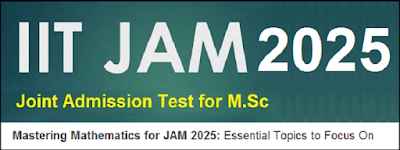Introduction:
As the Joint Admission Test for M.Sc. (JAM) 2025 approaches, mathematics aspirants are gearing up for one of the most competitive exams for entry into prestigious Indian institutes (IIT, IISc, NIT etc).
This guide is tailored to spotlight the essential mathematics topics crucial for cracking JAM 2025.
1. Real Analysis – The Rigor Behind Calculus
Why It's Important: Builds a deeper understanding of calculus, focusing on the structure of the real number system and functions.
Key Topics: Sequences and series of real numbers, continuity, differentiability, and Riemann integration.
Study Tips: Regularly practice proofs and conceptual problems to grasp the theoretical aspects.
2. Differential Calculus – The Heart of Change
Why It's Important: Central to understanding rate of change and slopes of curves – fundamental concepts in mathematics and physics.
Key Topics of JAM Maths: Limits, continuity, differentiability, and applications of derivatives.
Study Tips: Focus on problem-solving techniques and real-world applications to build a robust understanding.
3. Integral Calculus – Understanding Areas and Volumes
Why It's Important: Integral calculus helps in computing areas under curves and volumes of solids – a vital skill in mathematical analysis.
Key Topics: Definite and indefinite integrals, methods of integration, and applications.
Study Tips: Practice with a variety of functions and shapes to gain flexibility in solving integration problems.
4. Vector Calculus – Bridging Physics and Mathematics
Why It's Important: Vector calculus is crucial for fields like electromagnetism and fluid dynamics.
Key Topics: Gradient, divergence, curl, line, surface, and volume integrals.
Study Tips: Work on visualizing vector fields and understand the physical significance of the operations.
5. Linear Algebra – The Power of Matrices and Vectors
Why It's Important: Essential for solving systems of linear equations, a common problem in engineering and science.
Key Topics: Matrix theory, determinants, systems of linear equations, eigenvalues, and eigenvectors.
Study Tips: Practice matrix operations and explore applications in solving real-world problems.
6. Group Theory – Foundations of Abstract Algebra
Why It's Important: Group theory is pivotal in understanding symmetrical structures in mathematics.
Key Topics: Groups, subgroups, cyclic groups, cosets, and Lagrange's Theorem.
Study Tips: Work on understanding the structure of different groups and their properties.
Conclusion:
The journey to JAM 2025 is both challenging and rewarding. A strong grasp of these fundamental mathematics topics will not only prepare you for the exam but also lay a solid foundation for advanced studies. Dedicate time to practice, understand the underlying concepts, and approach your preparation with curiosity and commitment.
All the best for JAM 2025!





